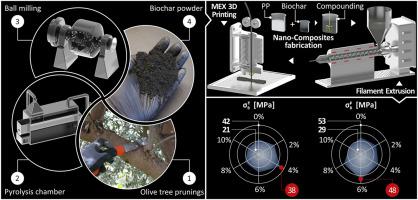当前位置:
X-MOL 学术
›
Biomass Bioenergy
›
论文详情
Our official English website, www.x-mol.net, welcomes your feedback! (Note: you will need to create a separate account there.)
Biochar for sustainable additive manufacturing: Thermal, mechanical, electrical, and rheological responses of polypropylene-biochar composites
Biomass & Bioenergy ( IF 5.8 ) Pub Date : 2024-06-07 , DOI: 10.1016/j.biombioe.2024.107272 Markos Petousis , Emmanuel Maravelakis , Dimitrios Kalderis , Vassilios Saltas , Nikolaos Mountakis , Mariza Spiridaki , Nikolaos Bolanakis , Apostolos Argyros , Vassilis Papadakis , Nikolaos Michailidis , Nectarios Vidakis
Biomass & Bioenergy ( IF 5.8 ) Pub Date : 2024-06-07 , DOI: 10.1016/j.biombioe.2024.107272 Markos Petousis , Emmanuel Maravelakis , Dimitrios Kalderis , Vassilios Saltas , Nikolaos Mountakis , Mariza Spiridaki , Nikolaos Bolanakis , Apostolos Argyros , Vassilis Papadakis , Nikolaos Michailidis , Nectarios Vidakis

|
The utilization of eco-friendly reinforcing materials and the fabrication of sustainable composites with enhanced mechanical and electrical properties are a subject of great scientific interest. Such research is aiming to be applied in a variety of industrial applications. In this study, polypropylene (PP) was used as a matrix material and combined with biochar (BC) as a filler at different loadings (2.0, 4.0, 6.0, 8.0, and 10.0 wt %) to produce reinforced composites. Biochar was produced from olive tree prunings. Additively manufactured specimens underwent a variety of tests (fourteen in total) regarding their thermal, structural, mechanical, morphological, and electrical properties. The mechanical properties of the PP were improved by the addition of 4.0 wt % biochar, as the tensile strength and modulus of elasticity, presented a 28.4 % and 24.3 % increase compared to that of pure PP. Overall, the 6 wt % was the optimum loading considering all the tests conducted. The thermal stability of the PP/BC composites was significantly improved compared to that of pure PP. At a filler loading of 8.0 wt %, the dc-conductivity of PP/biochar composite increased by more than 9 orders of magnitude, suggesting the existence of a percolation threshold, above which the polymer composite switches from insulating behavior to a conductive state. Overall, biochar addition had a positive impact on all measured quantities and proved to be an eco-friendly material suitable for use in various applications of additive manufacturing (AM).
中文翻译:

用于可持续增材制造的生物炭:聚丙烯-生物炭复合材料的热、机械、电和流变响应
使用环保增强材料以及制造具有增强机械和电气性能的可持续复合材料是一个具有重大科学意义的课题。此类研究旨在应用于各种工业应用。在这项研究中,聚丙烯 (PP) 被用作基体材料,并与生物炭 (BC) 作为填料以不同的负载量(2.0、4.0、6.0、8.0 和 10.0 wt%)结合来生产增强复合材料。生物炭是由橄榄树修剪产生的。增材制造的样品经过了有关其热、结构、机械、形态和电性能的各种测试(总共十四次)。添加 4.0 wt% 生物炭后,PP 的机械性能得到改善,拉伸强度和弹性模量比纯 PP 分别提高了 28.4% 和 24.3%。总的来说,考虑到所有进行的测试,6 wt% 是最佳负载量。 PP/BC复合材料的热稳定性较纯PP显着提高。在填料含量为 8.0 wt% 时,PP/生物炭复合材料的直流电导率增加了 9 个数量级以上,表明存在逾渗阈值,超过该阈值聚合物复合材料就会从绝缘行为转变为导电状态。总体而言,生物炭的添加对所有测量数量都有积极影响,并被证明是一种适合用于增材制造 (AM) 各种应用的环保材料。
更新日期:2024-06-07
中文翻译:

用于可持续增材制造的生物炭:聚丙烯-生物炭复合材料的热、机械、电和流变响应
使用环保增强材料以及制造具有增强机械和电气性能的可持续复合材料是一个具有重大科学意义的课题。此类研究旨在应用于各种工业应用。在这项研究中,聚丙烯 (PP) 被用作基体材料,并与生物炭 (BC) 作为填料以不同的负载量(2.0、4.0、6.0、8.0 和 10.0 wt%)结合来生产增强复合材料。生物炭是由橄榄树修剪产生的。增材制造的样品经过了有关其热、结构、机械、形态和电性能的各种测试(总共十四次)。添加 4.0 wt% 生物炭后,PP 的机械性能得到改善,拉伸强度和弹性模量比纯 PP 分别提高了 28.4% 和 24.3%。总的来说,考虑到所有进行的测试,6 wt% 是最佳负载量。 PP/BC复合材料的热稳定性较纯PP显着提高。在填料含量为 8.0 wt% 时,PP/生物炭复合材料的直流电导率增加了 9 个数量级以上,表明存在逾渗阈值,超过该阈值聚合物复合材料就会从绝缘行为转变为导电状态。总体而言,生物炭的添加对所有测量数量都有积极影响,并被证明是一种适合用于增材制造 (AM) 各种应用的环保材料。











































 京公网安备 11010802027423号
京公网安备 11010802027423号